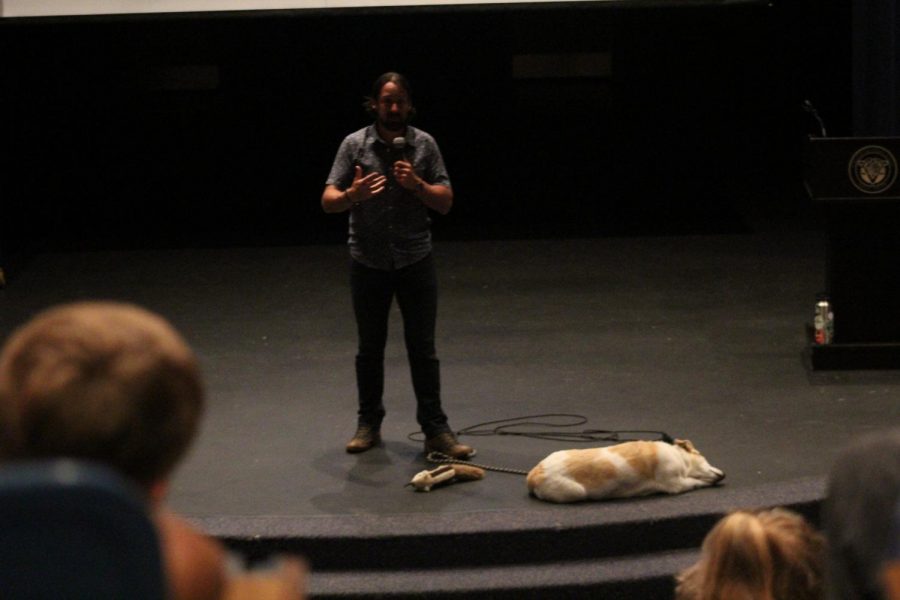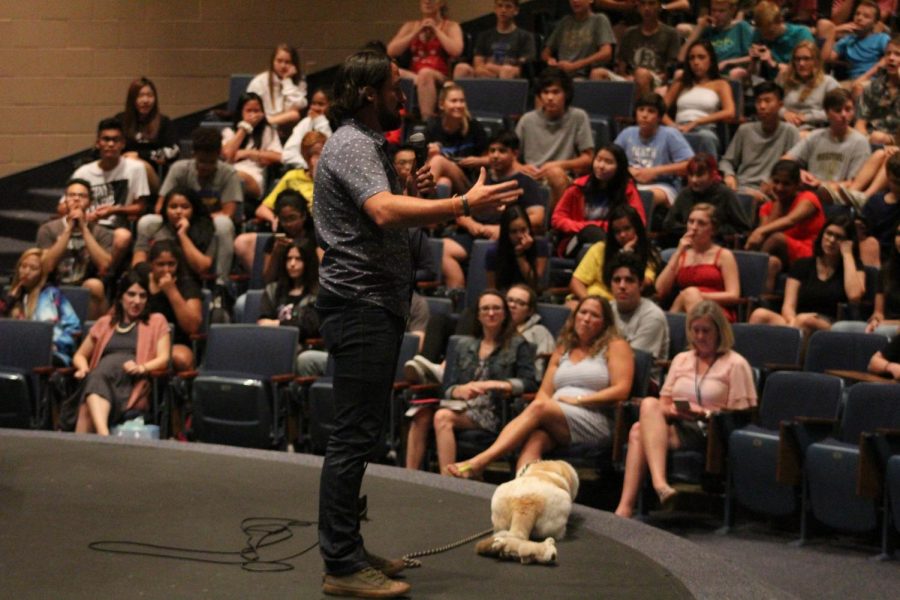Q&A with Author and Robinson Alum Craig Grossi
Craig Grossi is a Robinson alumnus and former Marine who adopted a dog overseas in Afghanistan and was able to bring him home. Grossi’s book, Craig and Fred, was this year’s school-wide summer read, and the Valor Dictus was able to catch up with him to ask some questions after he spoke to Robinson English classes this past Thursday and Friday:
What aspect of Fred’s personality do you think you connect best with?
“I would say how much fun he likes to have. Like, he’s always looking for a way to have fun. That’s kinda been me my whole life, I’ve always just been trying to have a good time and trying to do something… big. You know, he’s very ambitious in that way. It’s always kinda in pursuit of big things, and fun things, and the next adventure we could be on and stuff like that. But yeah, I think we both share an adventurous, fun spirit.”
Why do you think that he was so different from the other dogs in Afghanistan?
“I think he had something in him that was stubborn. I talk about stubborn positivity all the time because I think some people and some dogs just have different characteristics. I think for for him in those first months of his life when he was faced with that challenge, when he was faced with all the other dogs around him being a certain way, being kinda mean and nasty, he had a little bit of that drive in him to be different. He was different in a really important way. And I think that ultimately it’s serving a purpose still because of the story and because of the book and because of everybody that we meet like you guys that are inspired by it and are interested in it. I think that’s why he did it and that’s why we’re doing what we do.”
So you found Fred and connected with him, and of course the whole process of getting him home was difficult, but what would you say was the most difficult part of it?
“I would say that hiding him on Camp Leatherneck was probably the hardest part. The most dramatic and kinda interesting part was getting him on the helicopter, but, hiding him in plain sight on this big base, a place that you couldn’t even walk around without a clean shave and like a clean uniform, let alone having a dog. That was definitely the hardest part and that was where I thought that we’d definitely get discovered and get in trouble.”
So when you arrived home, you went on a road trip. What’s your favorite memory from that road trip?
“The Grand Canyon was really cool, obviously, but I think there was something special about Big Sur,when we went to Big Sur in California. The camping there was really cool and that was the first time Fred was in California and on the coast. There were so many moments when we would go on a hike or just be driving around the coast and we’d get out of the car and Fred would just walk up to a cliff and look out into the pacific ocean. It was really moving for me because that was the furthest we’d ever gone together, and thinking about where we started and where we had gone, it was just really cool.”
What made you decide to write a book about you and Fred’s story?
“A lot of things, I think. For one, I realized I loved to tell the story and I loved to write. The other thing was, the more I thought about it, the more I saw it kinda as my duty. There were so many ways that it could have gone wrong, and we could’ve gotten caught, I could’ve gotten hurt worse than I did, and the fact that we were able to pull it off against all these odds, we owed it to the other people, to my fellow servicemembers and just to anyone out there that’s got a story to tell. It wasn’t an easy process but we’ve been really persistent about getting the book published and continuing to travel and share the story and it’s kinda just become our duty.”
You said when you were at Robinson you weren’t the best student. What’s the feeling like coming back to Robinson having written a successful book?
“It’s cool. It’s funny, I think I’ve gotta be the first ‘D’ student to come back to Robinson and speak. It’s really cool because for me I’ve always respected and admired anyone that can excel in an academic setting, but for most of my school career all the way through elementary school and high school, that wasn’t me. And, it wasn’t that I wasn’t working hard, I worked just as hard if not harder than everybody else because I was trying to get ahead and get to where I was supposed to be, but I think for the culture in our school here is very academic and linear in terms of what it means to achieve and be successful. Hopefully for everybody,not just the kids that are struggling, but even the kids who are comfortable here and are getting good grades, they can see that there are other ways to be successful and there’s not just one path, it’s really up to you, and no one else is gonna define it for you.”
Coming back to Robinson, have you noticed any differences between students when you were at Robinson and students now?
“Actually no, it’s pretty funny. In terms of just looking around the auditorium yesterday and when we were here in the spring, it must be the building because the building hasn’t changed at all. I feel like it’s 2001 again, no one really looks any different, and the kids don’t dress any differently. I feel like I’m looking at my fellow student body back in 2001, it’s very interesting. Maybe it’s because I’ve been around so long it’s come full circle and like the things we were into have come back into trend? I don’t know. So, I feel very at home, I think that’s why.”
What was your favorite part about going to Robinson?
“Making friends. There’s so many people and it can be a little overwhelming, and I think I liked it. I liked that there was always somebody to get to know, every semester or every year you meet people that you might’ve been walking around in the halls with for two years but you never had the chance to actually talk to. Then you get in a class with someone and you get to know them. Just the volume of people and the potential for making new friends and having fun.”
You said that Robinson can be overwhelming. If you could give one piece of advice to the students, what would it be?
“Just take your time. If you’re feeling overwhelmed, that’s for a reason, and Robinson is overwhelming. It just is, and that’s okay. And I think one piece of advice would be to take a step back and realize that it’s okay to feel overwhelmed and in time it’s gonna be just like clockwork for you. And if you’re not making connections, if you’re not making friends right away, there’s no timeline for it, there’s no rush. You don’t have to feel like “oh, I haven’t made a friend in a couple days, I’m not gonna be happy,” you don’t need to have a deadline to feel comfortable, it’ll happen when it will.”
How did you come up with the term stubborn positivity and why is it so important to you?
“I think through telling the story and really analyzing Fred and who he was in Afghanistan, and what made me want to go over and talk to him and check him out, and the more I told the story the more I really thought about those first moments with him, the more I wanted to come up with a term, or just a philosophy. It also had to do with when I went back to school at Georgetown, I studied philosophy and being interested in other philosophers and how they define their own personal philosophy. I wanted to come up with my own term about this dog that has had a huge impact on my life and my ideas.”
Are you planning on writing any other books?
“Yeah! I got a jump start on the next one. It won’t be about me and Fred specifically, it’ll be more about other people with really great dog stories, specifically within prison systems that are having inmates train dogs as service animals. I want to explore some of those stories, so, we’ll see what happens.”
Keep a look out for more news regarding Craig Grossi’s next book and more adventures with Fred! For cute Fred pictures, follow @fredtheafghan on Instagram, Facebook, and Twitter.




